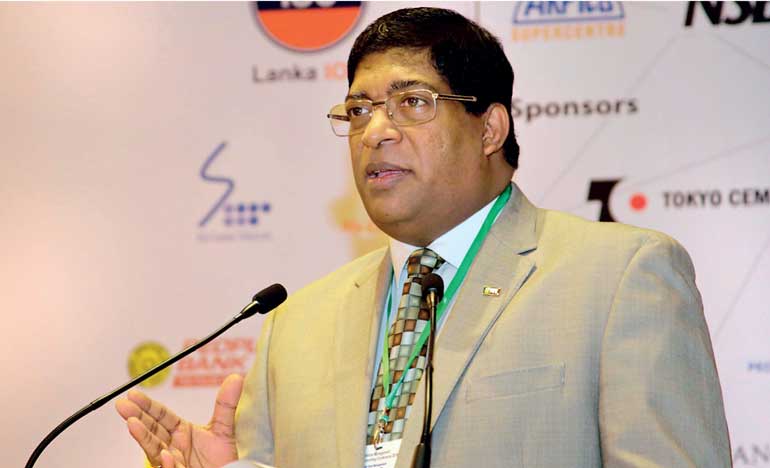Monday Feb 23, 2026
Monday Feb 23, 2026
Wednesday, 13 July 2016 00:00 - - {{hitsCtrl.values.hits}}
 Finance Minister Ravi Karunanayake – Pic by Lasantha Kumara
Finance Minister Ravi Karunanayake – Pic by Lasantha Kumara
By Charumini de Silva
While pledging that the Government was prepared to make every effort to make the Sri Lankan business environment more cost-effective and competitive, Finance Minister Ravi Karunanayake yesterday called on the private sector to take a lead role in the country’s economic development agenda.
Shedding some light on how public policymaking could facilitate the Total Cost Management (TCM) of the activities carried out by both the Government and the private sector, he stated: “The Government is doing its part to uplift good governance practices and make public financial management more transparent, productive and growth-oriented. But the private sector now ought to be leading the show by capitalising on the improved business environment and setting an example to the public sector on how to better do TCM, thereby sustaining economic development.”
The Minister made these remarks while delivering the keynote address on ‘TCM and Economic Development’ at the first session of the CMA National Management Accounting Conference 2016, held yesterday at Cinnamon Lakeside.
“The Government intervention in the economy is clearly shown by the fact that we implemented 1,051 development projects in accordance with the Public Investment Program last year. However, we believe that most of those projects can be effectively implemented with the participation of the private sector,” he added.
While saying that the Government continued to create a more cost-effective business environment, Karunanayake encouraged the private sector to support the implementation of the country’s economic development agenda. “We are in the process of putting in place formal regulations in respect to a public-private partnership (PPP). In this context, we aim to maximise the support from the Government for the business environment of the country by further strengthening macroeconomic sustainability through properly coordinated fiscal and monetary policies,” he pointed out.
In order to make the management of public finances more efficient and cost-effective, the minister said that the Government was in the process of introducing several reforms, including expenditure management and public procurement, the strengthening of Parliamentary oversight of public finances and the strengthening of the policy and institutional framework for the management of public finances.
Highlighting the recent measures that the Government has adopted to keep the country’s business environment cost-effective and competitive, Karunanayake said that the cost of capital for the construction of expressways had been reduced by 22% since the new Government took over, before adding that there was more room to bring it down to between 40% and 42%.
He said the major policy areas in the action plan include fiscal consolidation, revenue mobilisation, public financial management, state enterprise reforms, enhanced support from monetary policy and trade and investment facilitation.
Reasoning why Sri Lanka lagged behind while Singapore advanced as an economy, Karunanayake asserted: “Sri Lanka basically miscalculated its future movement. We boast that we provide education, health, fertilizer free — I mean from birth to death we get something for nothing. We spend Rs. 382 billion, which is effectively almost 20% of our total expenditure on subsidies, whereas in Singapore you won’t get anything free. This needs to be corrected.”
In recognising the Government’s commitment, the International Monetary Fund (IMF) recently approved a 3-year extended fund facility, which opened up more funding avenues for the country, Karunanayake said. He pointed out that these endorsements from international organisations such as that IMF would auger well for enhancing investor confidence in the economy.
“I’m a great believer that we don’t need foreign interference in our economic activities, but where it is good for our economy whether it comes from a socialist country, communist country or a multilateral economy it is something good for the economy. Hence, it was with the greatest of concern, with the abundance of prudence, that we decided that going with the IMF would be far more beneficial than going with the outside,” he explained.
The Minster asserted that the Government was committed to implementing the economic development agenda by generating employment opportunities, enhancing income levels, developing rural economies, ensuring land ownership and creating a wide and strong middle class.
Karunanayake said that the productivity of the labour force increased by 3.7% last year over 2014 and he promised to continue to improve labour laws which had become a hindrance to labour productivity in the country.
He went on to state that he would continue to improve the efficiency of legal systems which would offer a considerable boost to the economy and significantly aid the fulfilment of the country’s development goals.
“Prime Minister Ranil Wickremasinghe is very concerned about the landowning society in this country. Soon we will restore landownership to almost 1.2 million households over the next couple of weeks. We are getting the legal impediments changed. People will have household-owned society in this country,” the Minster noted.
Acknowledging that the Government had recognised the fact that public policymaking made a huge impact on the private sector and the entire economy, he assured that they would continue to develop the business environment of the country through improved transparency and good governance, thereby creating a level playing field.